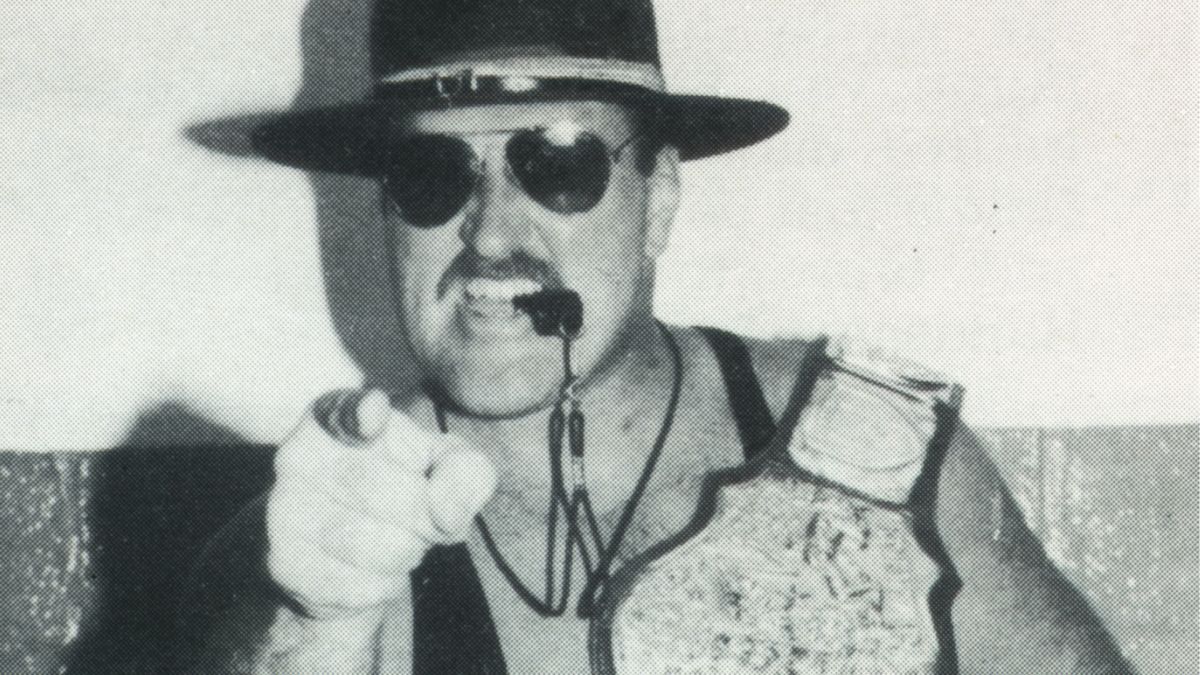BUFFALO, NY — It shouldn’t be surprising, but it almost always is. As fans, we tend to associate the characters that actors play with their real-life personalities. So it was that I approached Sgt. Slaughter backstage at the recent Ballpark Brawl with some hesitation. I’ll be honest — my push-ups aren’t up to snuff these days, so I was determined to be on my best behavior.
Instead, the very soft-spoken Bob Remus, emoting none of the brashness of his legendary military character, was gracious with his time and talked about his role in G.I. Joe, his turn as an Iraqi-supporter, and the way in which Vince McMahon acts as the moral watchdog of the WWE.
The role of the cartoon drill sergeant came about due to the desire of the show’s producers to create “a living G.I. Joe,” as Remus puts it. “At first I didn’t know quite what they were going to do with me. I couldn’t work for the WWF at the time, but I wanted to do G.I. Joe because I was a fan as a kid, and I knew the WWF would always be there for me.”

The living G.I. Joe — he was that, to be sure. That mighty chiseled chin, combined with the gravel in his voice barking out commands, gave him the showmanship required to pull it off, but it was the real-life credentials to play the role that made him the complete package. His background as a former Marine Drill Sergeant, a service during which he picked up the memorable nickname that was to become his in-ring persona, allowed him to bring a level of authenticity to his character. Seeing as he credits his success as a wrestler, in particular as a villain, to being “a real ring general,” it isn’t hard to see how he uses his past expertise to step into character.
It was a different story, of course, when a storyline was concocted to turn Sgt. Slaughter against the United States of America. It’s been well-documented how the storyline was at once perhaps the most successful in recent wrestling history at stirring raw emotions, but at the same time became a polarizing factor among fans, causing many to simply switch the channel (not to mention pass on tickets for Wrestlemania VII). Looking back, Remus doesn’t come out and say he regrets his part in the storyline, but it’s clear that the discomfort of playing off the headlines of real tragedy is still with him.
“I know I never felt too bad about starting it, but then when the war broke out it became a little more personal,” he recalls. “I tried to hold back a little bit.” Slaughter’s heel turn initiated in the summer of 1990, followed not long after by Operation Desert Storm’s initiation of air wave attacks against Iraq on January 19, 1991 — three days after Slaughter took the title from the Ultimate Warrior at the Royal Rumble in Miami. His manager at the time, Adnan Alkaissy in the role of General Adnon, has also recently spoken to Slam Wrestling about how difficult it was to pit the reality of war against what was likely supposed to be an easy way to create a villain out of Slaughter.
The ramifications of that storyline continue to this day.
“It’s a different time now, there are different rules,” Remus admit. “Now you have to worry about being taken off the station or losing sponsors.”
Specifically, Remus refers to the failed storyline of Muhammad Hassan as proof that the Sgt. Slaughter, Iraqi-sympathizer-type story just won’t work in these times. “They went in the wrong direction with that,” he says decisively. “They tried something by saying he was born in the United States, but he (Mark Copani) wasn’t the right guy for it. He shied away from it.” Essentially, if Hassan was posing as a proud American, the crowd’s “U.S.A.” chants should have pumped him up with energy as it would Slaughter, Hacksaw Duggan, or any other jingoistic wrestler that has chosen the wrestling ring as the place to defend America.
As for whether or not Copani went as far with the character as the writers would have liked, Remus admits that that’s there’s only one person in the company who decides how far the envelope can be pushed. “Vince always tells the talent ‘I’ll tell you when to back off, don’t stop until I tell you,'” he confides.
As for the exploits of Sgt. Slaughter in the cartoon world, there was a brief resurrection of an animated G.I. Joe show in 1990, and there have been rumors of a live-action movie buzzing around for a long time. With G.I. Joe‘s pop-culture counterpart, The Transformers, getting the live-action film treatment, could the cries of “Yo, Joe!” be far behind? And if so, will they be in need of a live-action drill sergeant?
“The door’s always open,” Remus says with a smile.
RELATED LINK



